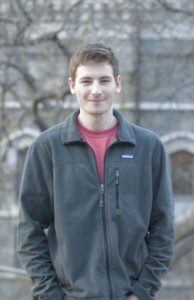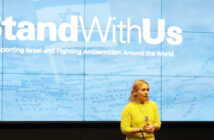
Jake Epstein
I unzip the skinny black bag and put together the tripod. Screwing the camera into place, I put it in focus and press the record button. A red light flashes.
Vianna Mustafa looks up from her coloring with obvious discontent.
“No!” she shouts. “I don’t want to be on camera.”
Frustrated, I lower my camera and walk away. She was providing solid background footage, and she didn’t even want her hands to be the subject of my shot. She wanted no part in it.
I am at the Cathedral Church of the Nativity, at the corner of Wyandotte and West Third Street. My group partners help me capture a unique aspect of life at the church.
Vianna is one of six children from the Mustafa family, a clan of eight who moved to the United States in September 2016 after spending over four years in refugee camps. They are from Aleppo, Syria.
After the Mustafas arrived in Bethlehem almost two years ago, teachers from the church visited their home with the goal of helping the parents assimilate into their new lives by teaching them English, helping them navigate the Bethlehem bus routes and instructing them on other aspects of life in the United States that adults face on a daily basis.
The children attend tutoring at the church for homework help, all while working to improve their English.
Our footage was intended to be for a final project for our journalism class, where we wanted to profile a few of the teachers and tutors, including Lehigh students who were involved.
While I was getting shots of the tutors helping the Mustafa children with their homework, Vianna kept a watchful eye on me. She was timid and desperately avoided getting in view of the lens. And though I complied, every time I stepped within a five foot radius of her, she felt obligated to remind me.
Olivia Tramontana is one of the teachers at the church and an original member of the team sent to first help the Mustafas adjust to Bethlehem life.
During an interview, she informed me that the children used to work in sweatshops while they were in refugee camps. They made a variety of products, from shoes to fabrics to pockets.
I understood why Vianna was timid.
Here I was, walking around with a fancy camera, speaking a very foreign language to her while filming her siblings. I felt pretty ashamed.
Toward the end of our interview with Olivia, we talked about what the future might hold for the Mustafa children. She said they have no real drive for a sustainable future.
“Developing a sense of hope is a great challenge for them,” Olivia said. “They don’t have a sense of tomorrow, let alone thinking about what they want to do in five years.”
She said the children lack hope to be independent, or to find a job. This confused me.
Away from the troubles of Syria, I would have assumed the Mustafa children would be excited for the opportunities that a freer and safer life in the U.S. could provide.
“That’s such a part of our culture that we have a hard time accepting that that’s going to be okay,” Olivia said.
I realized I feel entitled to a sense of a successful future. I wake up, go to school in the pursuit of a degree, assuming I’ll one day get a job and live on my own. The Mustafa children don’t share these same anticipations.
Perhaps this lack of expectations for a future job, house and financial stability is the culture in Syria, or maybe they are discouraged by the hardships they endured before they made it to the U.S. Either way, it isn’t my place to decide what is right or wrong, and how the Mustafa family should go about approaching their futures.
We come from different worlds, under different circumstances. Just because they now live in the U.S. doesn’t mean they have to adhere to western societal norms.
I thought about Vianna and her lengthy efforts to avoid being recorded by my camera. Despite my original pleading that only a few people would see the video, she still refused. But after my interview with Olivia, I realized that having footage of her didn’t matter — what I had learned about Vianna was far more valuable than what I could have possibly gained with the camera.
I assumed Vianna would want her story told or at least be okay with our portrayal of her as a refugee, relocated to Bethlehem. But despite my entitlement, she wasn’t ready to have her story told and I had to be okay with that — she had been through hardships that I can’t possibly imagine.
As journalists, we are always told to interview our sources and get the story at all costs. It was time for me to understand the impact that a cultural divide might have on my story. I may not have gotten the information I needed, or the footage I wanted, but I’ll live. I learned Vianna and I have different expectations about the future. In this circumstance, that is enough.
—
Jake Epstein, ’20, is an associate news editor and columnist for The Brown and White. He can be reached [email protected].




Comment policy
Comments posted to The Brown and White website are reviewed by a moderator before being approved. Incendiary speech or harassing language, including comments targeted at individuals, may be deemed unacceptable and not published. Spam and other soliciting will also be declined.
The Brown and White also reserves the right to not publish entirely anonymous comments.
3 Comments
Thank you for this view of an immigrant family. I think you got the story which is about both you and the family.
Jake, what you say is true. But your prof should also have told you not to film children without a signed release from their parents. They can’t give consent on their own. That kid was right from multiple directions in telling you to back off.
Respect people’s privacy. You are not usually entitled to violate it simply because you feel like you should be able to get a story, especially a feature. And if another child tells you no about something, and you’re not, say, the parent enforcing rules or getting shots taken care of, ****do not lean on that kid****. Remember no means no? No means no.
Amy, Amy, Amy. Of course it’s you, twisting another article to afford you an opportunity to stand on your soapbox. A sad, boring life you must live, despite telling yourself that you’re doing God’s work by lecturing those less enlightened than you on a college newspaper web forum. Oh, I’m sorry I said “God’s work.” God is, of course, a mythical being created by the patriarchy to suppress the weak and less fortunate. And you know who loves God? The Board of Trustees. Burn it all to the ground! The trustees are blood sucking leaches! Where was I again? Oh, right. This is a comment about filming a child without his or her consent (I’m sorry for using masculine and feminine pronouns—how cisgender of me), despite Jake writing that he lowered his camera and walked away and complied with the girl’s request not to be filmed. Alas, woe is you Amy!